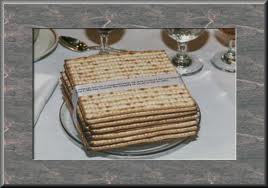The directive to observe and the rules concerning how to observe Passover and the Feast of Unleavened Bread is recorded in Leviticus 23:4-8 (cf. Exo. 12:15; 13:6; 23:15; 34:18; Num. 28:17
- The Feast of Unleavened Bread begins on the 15th day of the Month Aviv
- Exo. 12:15 defines for us the process
- the feast lasts for 7-days
- we are to discard leaven out of our homes
- we are to eat unleavened bread (aka: matsah) throughout this 7-day perioid
- we are to bring a gift/offering when we appear before Yehovah
Passover and Unleavened Bread has traditionally been viewed as one-feast that is a joyful celebration. As it relates to the consumption of matzah during this 7-day observance, it was to serve as a remembrance of the children of Israel’s hasty departure out of the land of Egypt (reference: Deut. 16:3)
Feast=chag (khawg)-Hebrew for festival–a gathering–a pilgrimage that implies hagag, Hebrew for celebration; a day to hold or keep; a holy day.
This 7-day pilgrimage festival appears to have been filled with prayer, praised, and godly meditation.
Yeshua was diligent to keep the Passover–reference Matt. 26:17-20; Luk. 22:15; Joh. 2:13, 23. At 12-years of age Yeshua’s parents went up to Jerusalem to observe the Passover–reference: Luk. 2:41-50.
The crucifixion occurred on Passover in the year 28 CE–Matt. 26:2; Mar. 14:1,2; Joh. 18:28
Yeshua is referred to as our Passover by Paul (I Cor. 5:7) and John the Immerser.
Like Passover, Unleavened Bread provides the Believer in Messiah with a beautiful shadow picture of good things to come. Yeshua, our Passover, atoned for our sins. He was the perfect sacrifice that provided a means for us to have direct access to the Creator 24/7. As it relates to the Feast of Unleavened Bread, the process of purging sin from our lives becomes a formal, key element in the redemption plan and process. Our bodies have been likened to the Temple of Yehovah. When Solomon completed the building of the Temple, he had it dedicated to Yehovah for a period of 7-days (reference: 2 Chr. 7:9). Additional references: Lev. 23:36; Num. 7:10; 2 Chr. 30:23)

